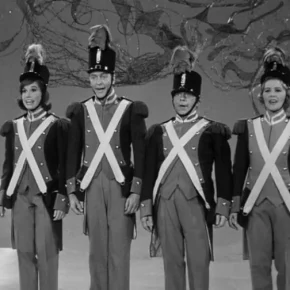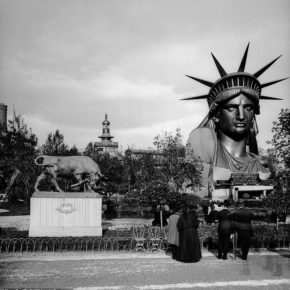 To beat the heat, sprite and I went to see Les Poupées Russes (Russian Dolls) this evening. It’s the sequel to the wonderful L’Auberge Espagnole (Spanish Apartment) from 2002, and finds the same characters, five years after their exchange year in Barcelona, reuniting for a wedding in St. Petersburg, Russia.
To beat the heat, sprite and I went to see Les Poupées Russes (Russian Dolls) this evening. It’s the sequel to the wonderful L’Auberge Espagnole (Spanish Apartment) from 2002, and finds the same characters, five years after their exchange year in Barcelona, reuniting for a wedding in St. Petersburg, Russia.
This film is a suitable sequel: it has nearly all of the charm of its predecessor, likely due to the fact that the same writer/director (Cédric Klapisch) and cast returned for the second installment. It finds Xavier (Roman Duris) still unlucky in love and unable to get his writing published beyond an occasional freelance article in the local paper. He’s broken up with Martine (Audrey Tautou), had an unsuccessful romance with Neus (Irene Montalà ), and is writing his life’s story. He happens upon another member of the Barcelona apartment, Wendy (Kelly Reilly) briefly in Paris, and thinks back to what could have been in their relationship.
Xavier and Wendy are brought together again thanks to two events: Xavier’s TV script for French TV has been optioned by BBC2, which requires him to find an english-speaking writer to tidy up the script; and a visit from William (Kevin Bishop, one of the Brits from the apartment whose sister (the same Wendy) happens to be a highly-regarded writer. William tells Xavier about his upcoming wedding to Natacha (Evguenya Obraztsova), a Russian ballet dancer for whom William was a lighting tech. William immediately fell in love with her, and even followed her to Russia after a year of learning Russian to break down the language barrier – and their wedding is what bookends the film.
Many of the principal players from L’Auberge Espagnole are featured in Les Poupées Russes, though Klapisch wisely keeps the number of central characters down – a good move, as the story takes place in many locations. Xavier is still the guy who doesn’t quite have his act together, who stands at the edge of love yet isn’t able to grasp a good relationship. His relationship with Martine is a good friendship, but he can’t quite accept her faults (e.g. she has a young child, yet she still lives the life of a single person who can work 100-hour weeks). He still fast friends with Isabele (Cécile De France), his lesbian friend who also has yet to find a steady, loving relationship.
And then there’s Wendy – the friend he sees as “a sister,” a person with whom he shares so many qualities. Xavier loves Wendy, and when they meet again she is in an abusive, on-again-off-again relationship with Edward (Gary Love). The portrayal of Xavier and Wendy’s relationship is so wonderfully executed, and I applaud Klapisch’s use of slow shots full of body language and expressions. The effect of these shots says more than any spoken dialogue could possibly achieve, and it’s an under-utilized technique in modern filmmaking.
So the story ebbs and flows, as Xavier and Wendy come ever closer to becoming lovers. Both have external temptation, as both keep looking for the perfect, flawless mate. And at a time of extreme tension, they are brought together in St. Petersburg for the wedding.
I really liked this movie. It’s simple and moves at a deliberate speed that’s neither too fast, nor to slow. The cast has such wonderful chemistry, and Klapisch allows them to move and use their surroundings in a way where each shot has multiple layers of meaning. Filming on location in Paris, London and St. Petersburg also helped a lot, as the supporting cast featured natives from each location which added a lot of authentic charm to the little scenes with family and friends. And like the first film, the local languages are used throughout: French in France, English in England, and Russian in Russia. Yes, it means you need to read a lot of the film, but it works so seamlessly that you begin to understand many of the lines without translation after a while, so good are the actors’ expressions and staging of the scenes and story.
This is a superb film – easly a top-10 for 2006 (even though it was released overseas in 2005 – it’s an ’06 film to me). If this one comes to your local art house, see it – but be sure to rent or borrow the equally-superb L’Auberge Espagnole first.















sprite
17 July 2006 — 10:45
I always think that if a foreign subtitled film is good, you stop noticing that you’re translating after a while, and this was definitely the case with both of Klapisch’s movies.